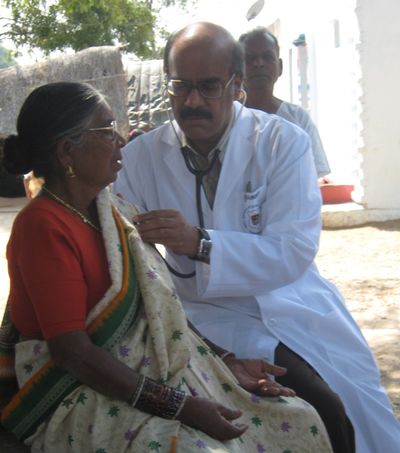COVID-19 EXPOSED THE chinks in our armour. Our health care system, already overburdened, was stretched beyond limit. The second wave particularly left us gasping for breath. But Covid-19 was not all about loss. There has been a lot of learning as well, says Dr D. Nageshwar Reddy, chairman of AIG Hospitals, Hyderabad. Excerpts from an interview:
Q/As a doctor and chairman of the hospital, what has been your learning from Covid-19?
A/The most important thing we learnt was regarding focus on infection control, which has been very poor in our country—not only as a public health component, but also in hospitals. Simple things—like frequent hand washing, using PPE kits and masks and maintaining distance in the hospital—were not observed earlier, but are being practised now. These are good practices that will not only defeat Covid-19 but also other infections.
The second lesson was on how to manage our resources properly. For example, we realised how to use oxygen in the right way for the right patient. Though the oxygen capacity in our country was large, we were not able to deliver it because we did not have enough trucks. We realised that every hospital needs an oxygen plant.
The third lesson we learnt was that there was a definite integration between non-communicable and communicable diseases. For instance, we realised that in Covid-19 patients, the ones who had a higher mortality rate or whose condition turned severe were those who had diabetes, hypertension, cardiac problems and so on. So an important lesson we learnt was to not only look into infection, but also into the preventive aspects of non-communicable diseases.
The fourth lesson was about the importance of virtual medicine, not only in terms of communication and patient treatments, but in terms of manpower, too.
Q/Though telemedicine has made health care more accessible, there are still tier-II and tier-III cities that lack access to advanced treatments. Do you think hospitals should start expanding to these cities?
A/Absolutely. Our private sector is very strong in metros, but not that strong in tier-II or tier-III cities. Ideally, we should have a spoke-and-hub model, where large metro hospitals have small centres in tier-II and tier-III cities. They can then collaborate among themselves to form a chain of health care, where people are treated with adequate care in these cities…. So we have to structure our care very carefully, in a pyramid fashion, where most common diseases are effectively treated in primary centres. To some extent, primary health centres are supposed to do that. Unfortunately, they are not playing that role because of several reasons….
Another important role is communication, between hospitals and doctors themselves. For example, if I am working in a small village or city, and I do not understand a patient’s condition well, I can communicate with bigger centres, and then get help through them or even electronically show the patient to the doctors there. This is happening to some extent. Like, we are connected with the Mayo Clinic in the United States. The other important component of this is electronic medical records. And this is where our country is lacking a lot. We need to have very good electronic medical record system because only then can we transmit data from one centre to another, and study patient histories and give proper advice.
Q/What kind of innovations is the hospital working on?
A/Innovations are important, especially for a country like ours, to cut down costs and to treat our type of patients who are different from those in the west. So, we have brought the clinician directly in contact with basic scientists. The Institute for Basic Sciences at the Asian Healthcare Foundation works towards bridging the gap between research and patient care.
Similarly, we have got engineers from IITs and the Indian Institute of Science coming together to make cheaper instruments. For example, with our basic scientists, we were able to establish a very high-end stem cell lab. We are able to produce liver cells, cardiac cells and so on. This has very high potential because these artificial cells can then be used to treat the patient.
In terms of engineering innovations, we are bringing out certain type of devices that can help treat diabetes. These are small bags, into which we can load insulin producing cells and put it under the patient’s skin to produce insulin. We have also teamed up with the Indian Institute of Science to create endoscopy simulation machines, which are extremely costly otherwise. We will be able to make very cheap machines, which can teach students how to do various endoscopic surgeries.
Q/It seems like we will be living with the pandemic for some time. What advice would you give to people going forward?
A/First of all, I am more optimistic. I think we are out of this pandemic to a large extent and Covid-19 is going to become an endemic disease, meaning it is going to be present in small pockets continuously throughout the year, and might not come in huge spurts worldwide. So the pandemic is slowly becoming endemic now. You can see this very clearly in our country. The reasons for this are: one, of course, vaccination; two, the population is developing antibodies against the virus. And, we are getting very effective treatment.
For example, we have recently published a large study in the Journal of Internal Medicine, where we showed that monoclonal antibodies have 100 per cent success in reducing the severity of the disease and preventing them. There are two new oral antiviral drugs that are coming in. And so this is going to become a very easily treatable disease.
However, I would suggest that we follow the Covid-19 protocols till the middle of next year…. Everyone should get vaccinated. This vaccination is going to be an annual phenomenon for all of us, as we have found that after six to nine months, antibodies come down. So you have to get yourself re-vaccinated, or booster doses have to be given.



